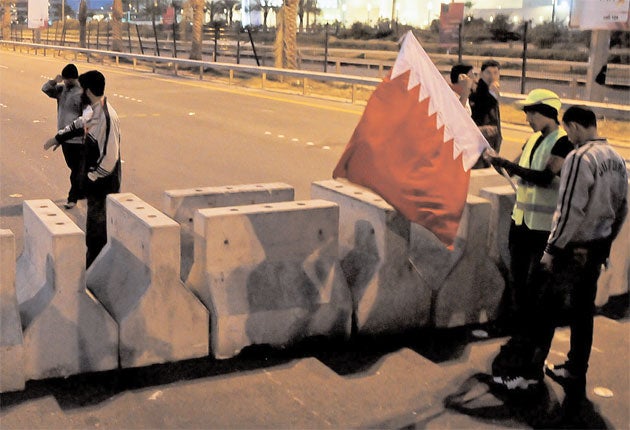Saudis send troops into Bahrain to quell protests

Saudi Arabia sent troops into Bahrain yesterday to quell protests by the Shia Muslim majority against the Sunni monarchy, in a move that the opposition denounced as an act of war.
Saudi armoured vehicles rolled along the 16-mile causeway linking Saudi Arabia and Bahrain in an unprecedented armed intervention likely to provoke a new crisis in the Gulf.
About 1,000 Saudi soldiers entered the island, a Saudi official said. Witnesses said about 150 armoured vehicles and 50 other vehicles – including jeeps, buses, ambulances and water tankers – took up positions in the district of Riffa, where the royal family lives and where there is a military hospital.
The Saudi intervention is the first time that any Arab state has acted to quell protests in another since the wave of uprisings began in the region. The Bahraini government had earlier called for support from its neighbours after fighting in the streets of the capital, Manama, on Sunday, in which demonstrators routed riot police.
On Sunday morning the police attacked a small camp of pro-democracy protesters with tear gas and rubber bullets, but the raid provoked fighting in which the protesters seized control of much of Manama's financial district. This led the ruling al-Khalifa family to request a task force from the other five members of the Gulf Co-operation Council (GCC), which also includes Saudi Arabia, Oman, the United Arab Emirates, Qatar and Kuwait.
The Saudi rulers are worried that unrest among the Shias of Bahrain will spread to their own Shia population in the neighbouring Eastern Province. Saudi security forces have been trying to prevent protests in the kingdom from gaining momentum.
The opposition in Bahrain, including the Shia Wefaq party, issued a statement saying: "We consider the entry of Saudi Arabia or other Gulf forces into the Kingdom of Bahrain's air, sea or land territories a blatant occupation." It added that Saudi intervention threatened Bahrainis "with an undeclared war by armed troops".
So far the Saudi troops, presumed to be accompanied by smaller forces from other GCC states, have not appeared on the streets, where security remains in the hands of the police. Demonstrators have erected barricades blocking the main road leading to the financial district. Police checkpoints have sealed the road to the airport.
The protesters appear to have moved into the business district in order to raise pressure on the government. Businessmen working in Bahrain's offshore banking hub were forced to walk miles to their offices in high-rise buildings in the centre of Manama. Protesters had gathered earlier outside the Bahrain Financial Harbour, which is owned by the Prime Minister, Khalifa bin Salman al-Khalifa, who has been accused of corruption. They also moved to the campus of the main university and against the royal palace in Riffa, where they were opposed by police and Sunni civilians wielding swords.
Bahrain has hitherto been an absolute monarchy, with the King appointing 40 members of the Senate who can overrule the 40-member lower house of parliament. Gerrymandering prevents the Shia from winning a majority of the seats in the lower house.
The sudden escalation of the crisis in Bahrain comes just after the United States Defence Secretary, Robert Gates, visited the island to urge leaders to move on reform. He said he had told King Hamad bin Isa al-Khalifa and the Crown Prince that "change could be led or could be imposed". Mr Gates said there was no evidence of Iranian involvement, but that Iran might exploit the protests for its own ends. He added: "Time is not our friend."
Bahrain is the base for the US Navy's Fifth Fleet, making what happens there significant to the US position in the Gulf and its ability to confront Iran.
Bahraini leaders have long claimed their opponents are agents of Iran, but US diplomatic cables released by WikiLeaks say there is little evidence of this. The six senior Shia clerics in Bahrain are not considered militant, although they have backed the protests.
The protesters at first sought to downplay sectarian differences on the island, saying they were inspired by the demand for democracy, rule of law and civil rights in Tunisia and Egypt. The initial demand was for a constitutional monarchy, but after police killed seven protesters last month attitudes among the opposition hardened and many now want an end to the monarchy.
Join our commenting forum
Join thought-provoking conversations, follow other Independent readers and see their replies
Comments
Bookmark popover
Removed from bookmarks